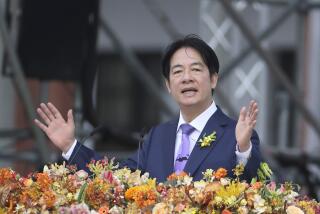China Says It Will End Maneuvers as Planned
- Share via
BEIJING — Satisfied that a threatening message about independence has been sent to Taiwan’s electorate and political leadership, China on Thursday said its military exercises and missile tests in and near the Taiwan Strait will not be extended beyond next week’s presidential election on the island.
A Foreign Ministry spokesman announced Thursday that Beijing will conclude its naval and air force exercises off the coast Wednesday as scheduled, three days before Taiwan’s first direct presidential election. Test firings of medium-range M-9 missiles to target zones near the Taiwan coast are scheduled to end today.
“The exercises will come to an end as scheduled,” Foreign Ministry spokesman Shen Guofang informed reporters. However, Shen stopped short of ruling out new military activities in the 100-mile-wide strait at some future date.
China has also told the United States that it does not intend to attack Taiwan, the Defense Department said Thursday.
“In public and private conversations, the United States has been assured that the Chinese do not intend to take any military action against Taiwan,” Navy Capt. Mike Doubleday, a Pentagon spokesman, told reporters.
The announcement was one of several simultaneous signals sent by the Chinese leadership, including statements by the country’s military chiefs and a report in a pro-Beijing newspaper in Hong Kong that appeared to be aimed at calming fears of a military conflict in the Taiwan Strait.
In a statement before the National People’s Congress session in Beijing, China’s top general, Liu Huaqing, said the massive naval and air exercises that began Tuesday in the waters separating Taiwan and the mainland were “purely for the sake of defense.”
“China will neither invade any other country nor join in the arms race even when it lays claim to a greater national strength in the future,” said Liu, China’s most senior general and vice chairman of the powerful Central Military Commission.
Meanwhile, the Hong Kong newspaper Ta Kung Pao, often used by the Beijing regime to disseminate its views, published an interview with a senior Chinese diplomat reassuring Hong Kong residents worried about a military conflict between the mainland and Taiwan.
“Hong Kong people need not worry. They should continue with their work,” said Zhang Junsheng, deputy director of the New China News Agency bureau, which serves as China’s de facto embassy in Hong Kong.
The Chinese peace signals came two days after senior Taiwanese officials told The Times that they are ready to upgrade relations with the mainland after the March 23 presidential election. Taiwanese Foreign Minister Fredrick Chien and Justice Minister Ma Ying-jeou said that if China halts its military activities in the strait, Taiwan will push for new talks.
“Everyone realizes that we should . . . make relations closer and more cooperative,” Ma said. Although the heightened military tensions have raised alarms in Washington and other capitals, some more optimistic analysts have characterized Taiwan’s upcoming presidential election and China’s military exercises as an elaborate chess game leading to a more stable political and economic relationship.
Chinese Foreign Ministry spokesman Shen said Beijing’s decision to stick to its announced military timetable will remain intact even if Nationalist Party leader Lee Teng-hui is chosen as Taiwan’s first popularly elected president. Lee, 73, who assumed the presidency in 1988 and was reelected president by the National Assembly in 1990, has been accused by the Beijing leadership of conducting a secret campaign seeking independence for Taiwan. He is heavily favored to win the election.
Several Hong Kong and Taiwanese newspapers, quoting sources in Beijing, had reported that China planned to extend or enlarge its military exercises if not satisfied with the Taiwanese election results.
However, in response to a reporter’s question about Lee’s probable victory, Shen affirmed the right of the Taiwanese electorate to choose its leadership.
“The people of Taiwan should be able to choose by their own will the candidates of their choice,” Shen said. “Our real concern is whether the Taiwanese authorities will give up their two-China policy. No matter what the outcome of the election, Taiwan will remain part of China and its leaders will just be leaders of a Chinese region.”
The statement is consistent with the mainland China position that Taiwan is a province of China--albeit the only “province” to hold open and free elections.
On Thursday, Lee traveled to the Taiwanese-held Pescadores islands near the site of Chinese military maneuvers in a defiant gesture aimed at Beijing.
“They [the Chinese] are staging exercises southwest of the Pescadores, but here nobody is scared,” Lee told reporters who accompanied him on the trip.
China’s live-ammunition military exercises, involving as many as 40 People’s Liberation Army warships and several squadrons of bomb-laden aircraft in a 6,600-square-mile area of the Taiwan Strait, have raised alarms in neighboring Asian countries and panicked regional stock markets in Taiwan and Hong Kong.
On Thursday, Shen blamed the stock market panic on the U.S. decision to send two aircraft carrier battle groups into the area.
“What has caused fluctuations in the stock markets is not the military exercises but the U.S. movements of aircraft carriers into the area,” the Chinese spokesman said. “That is really a reckless move.”
* HOME FOR HISTORIC VOTE: Taiwanese in Southland return to island to cast ballots. B3
More to Read
Sign up for Essential California
The most important California stories and recommendations in your inbox every morning.
You may occasionally receive promotional content from the Los Angeles Times.













